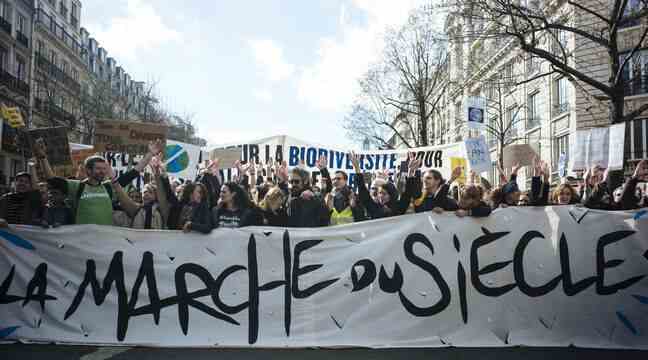“Look up”… This is the message to the presidential candidates that the 498 NGOs and collectives who are organizing a new salvo this Saturday intend to send of “climate marches” across France. A nod to Don’t Look Up, the phenomenon film released at Christmas on Netflix. A thinly veiled satire on our societies’ indifference to climate change.
One hundred and twenty-eight events, in as many cities in France, are on the program. In the vast majority of marches as in Paris, where the meeting is fixed at 2 p.m., place de la Nation, to join République via Bastille. “But also sometimes debates, citizen forums”, adds Marie Cohuet. The challenge ? “To show that climate issues matter to many French people and that they deserve to be included in the campaign”, launches the spokesperson forAlternatiba, citizen mobilization movement on climate change. She answers questions from 20 minutes.
With the war that has just broken out in Ukraine, do you fear that environmental issues will completely disappear from the countryside?
It is precisely against this fatality that this new climate march has been organized. Even before the outbreak of the conflict in Ukraine, it was already observed that the environment was completely neglected in this presidential campaign. Climate issues have not occupied than 2.7% of speaking time in the media in the week of February 8 to 13 *. However, 94% of French people believe that the climate crisis is a crucial issue. Opinion studies on the priorities of the French for this campaign conclude that this issue comes before security and immigration.
Will these marches be an opportunity to remember it on Saturday?
The purpose of these great marches is always twofold. They are already gateways for those who want to get involved in the fight against climate change. This is an opportunity for many to make first contact with NGOs, to hear their speeches, to discover the panoply of their actions. But it is also and above all an opportunity to count and impose the subject in the debate, by showing that thousands of people take to the streets to call for better consideration of climate issues in our policies.
It is this shock that we hope to create on Saturday among the candidates still in the running. These marches do not have a trivial impact when the mobilization is there. We saw it in Germany on September 25. Two days before the crucial legislative elections for the future of the country, 620,000 environmental defenders [selon l’organisateur, Fridays for future] had taken to the streets, which helped bring to power a coalition with a more pronounced environmental sensitivity than the previous government.
Are there even issues that converge, in your view, between the war in Ukraine and the climate crisis?
The idea is not to make hierarchies between these terrible news. But it is to emphasize that our future depends as much on the global geopolitical tensions that are taking place right now as on the climate policies that are being put in place now. Mobilizing for the climate remains a necessity even in this context of war in Ukraine.
This conflict also raises questions that affect ecological transition, in particular through the EU’s heavy dependence on Russian fossil fuels. As we can clearly see, the government [Bruno Le Maire ce lundi encore] continues to warn us of the repercussions that this conflict will have on our daily lives, particularly through soaring gas prices.
The last marches for the climate, on November 6, 2021, in the middle of COP26 in Glasgow, had mobilized little in France…
We were still in a context marked by Covid-19. In addition, several French NGOs, including Alternatiba, had rather chosen, for this day of international mobilization, to carry out actions of civil disobedience in Glasgow rather than marches in France. On the other hand, on March 16, 2019, the March of the Century had gathered 350,000 demonstrators. [selon les organisateurs toujours] in France. A few months earlier, the deal of the century [action en justice lancée par quatre ONG, qui a abouti à la condamnation de l’État pour « inaction climatique » en 2021] had gathered more than two million signatures, making this petition the most signed in France. We were also still in the midst of the “yellow vests” movement, with which climate NGOs had forged links, particularly on the idea that the end of the world and the end of the month were ultimately part of the same fight. In short, there was an alignment of the planets so that the climate issue was pushed very high in the public debate.
We can estimate that today we are closer to the context of March 2019 than to that of last fall. With the conflict in Ukraine, the alarming new IPCC report [sur l’adaptation au changement climatique, le 28 février], but especially the upcoming presidential election. There are many of us who do not want to wait to slip our ballot into the ballot box to be heard. A positive sign: we are 498 NGOs and collectives to call for this major event. It’s a lot and in the lot, some are joining this coalition for the first time.

